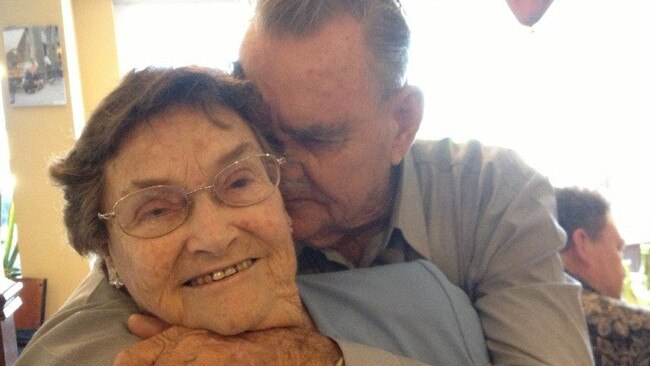Sedated sister of VC hero like a ‘zombie’
A blind woman in a Queensland nursing home has been sedated on a potent combination of psychotropic drugs.

An 88-year-old blind woman in a Queensland nursing home has been sedated on a potent combination of three psychotropic drugs, including medication that experts say should never be given to the elderly and another that is banned for older patients in the US.
Gwenda Britton, the sister of one of Australia’s most decorated soldiers, Keith Payne VC, has lived in the Blue Care Bluehaven Lodge residential aged-care facility in Ingham since October 2017.
Family members and friends who have raised concerns with the nursing home manager and her local doctor say the cocktail of drugs she was given have left the mother of four looking and sounding like a “zombie”.
Ms Britton’s case is symptomatic of a broader crisis in aged care, which will be a key focus of a royal commission into the sector next month, where commissioners will hear from doctors who say short-staffed nursing homes force them to drug residents to make care easier and providers push the blame back on to clinicians who are the only ones capable of issuing prescriptions.
Mr Payne, 83, who fought in the Korean and Vietnam wars, yesterday raised the alarm over his sister’s care. “She is so unwell and last time they tried to feed her she couldn’t even swallow and vomited it all back up,” he said.
Just weeks after the royal commission revealed a key focus of its inquiry would be the misuse of heavy drugs to “chemically restrain”, The Australian has obtained the pharmacy records for Ms Britton, the eldest of 13 children, which reveal a roster of doping agents so severe she is unable to speak.
Videos of the great-grandmother, who helped run a sugarcane farm with her late husband John, show her speaking clearly on some days, and barely able to hold her head up on others.
The Aged Care Quality and Safety Commission, after being contacted by The Australian, “made immediate contact” with the nursing home.
“Our assessment team has spoken directly with the manager of the facility today to discuss Ms Britton’s care, and the purpose of the medications that are currently prescribed by her treating doctor,” a spokeswoman for the aged-care watchdog said.
“The commission will be following up over the coming days with the provider to ensure Ms Britton’s safety and wellbeing.”
Speaking over the phone, Ms Britton said she “feels tired all the time”. “I feel worse since coming in here,” she said. “My memory is very good, really, except I am tired because of the drugs. The nurses come around, they don’t tell me what the drugs are, they just say can you take this and that.”
Ms Britton, who has only recently been diagnosed with dementia, has been prescribed sedative drugs to control “calling out” behaviour.
Her daughter Roslyn Britton said she had to call out for help because she was blind and often needed assistance in finding her buzzer or completing simple tasks.
Ms Britton has been prescribed twice daily 0.5mg doses of risperidone, which in the US carries a label warning of side effects such as stroke and even death and is not approved for use in elderly patients. Risperidone was developed to treat schizophrenia and is classed as an antipsychotic.
She is also taking 100mg of the SSRI antidepressant fluvoxamine — considered by experts to be the most sedating of all other antidepressants of that type — and “as-needed” 2mg doses of Valium, otherwise known as diazepam which is regarded as the strongest benzodiazepine on the market.
Two weeks after revelations in The Australian earlier this month, Aged Care Minister Ken Wyatt was forced to intervene and direct his department to develop regulations designed to crack down on the misuse of psychotropic drugs among the elderly.
Last Friday, the Department of Health also quietly updated guidance notes on new, universal standards for aged-care providers to make specific reference to the problem of these drugs being used to chemically restrain residents, almost two years after being told by experts this needed to be done.
Dementia researcher and former pharmacist Juanita Westbury, who has authored the largest study of psychotropic use in Australian nursing homes, with a sample size of more than 11,500 residents, said the combination of drugs Ms Britton has been prescribed is dangerous.
“Diazepam is on the inappropriate medication list for anyone over 65 years — it has the longest half-life of all benzos,” she said. “In older people — most of whom have impaired liver metabolism — it sticks around for a long time. Falls and impaired language are the main side effects. The trifecta (one of each of the three psychotropic classes) increases sedation, the rate of falls, pneumonia and is basically poor prescribing.”
A spokeswoman for Bluehaven Lodge said, while staff were committed to the quality of care and safety for residents, it could not comment on individual cases.
“Decisions regarding the prescribing of prescription medications can only be made by a resident’s general practitioner or specialist physician,” the spokeswoman said.
A healthcare professional involved in Ms Britton’s treatment said the prescriptions were “appropriate” but declined to go into detail about what behaviours had made them necessary.
The clinician denied fluvoxamine had any sedative effects.
A nationally respected geriatrician contacted by The Australian, who did not wish to be named, said that was not the case. “Fluvoxamine is particularly nasty in the elderly. I do not prescribe it,” he said. “Personally, I don’t prescribe diazepam to elderly patients either.”



To join the conversation, please log in. Don't have an account? Register
Join the conversation, you are commenting as Logout